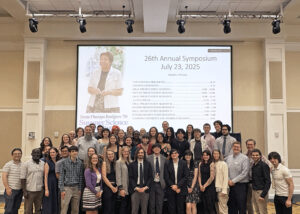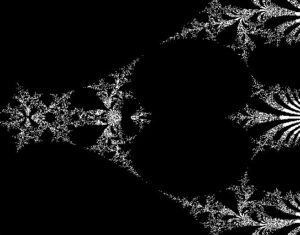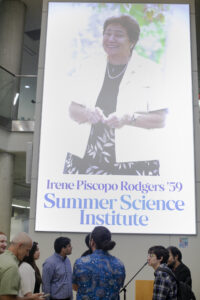Cold bottled water can be refreshing on a hot day, but hydration might not be its only effect. A chemical called DEHP can leach from plastic into drinking water, combining with bodily enzymes to form small molecules called metabolites.

“Research into their health effects is lacking,” said University of Mary Washington chemistry major Lily Gruss ’27, so she and Professor of Chemistry Davis Oldham spent the summer synthesizing them in a Jepson Science Center lab. “It will make it easier to isolate and study them.”
Lily, along with environmental science and biology major Joey Gasink ’26, presented research that placed first at Mary Washington’s Irene Piscopo Rodgers ’59 Summer Science Institute (SSI). Both earned awards through the John C. and Jerri Barden Perkins ’61 College of Arts and Sciences Student Research Endowment, which will support their future studies and fund other high-impact learning opportunities – such as attending academic conferences – that are an integral part of the UMW experience.
The 10-week SSI program, now in its 26th year, gives undergraduate students the chance to engage in intensive research with their professors and peers. Thirty participants spanning STEM-related disciplines – biology, chemistry, computer science, Earth and environmental science, physics, mathematics, and geography – shared their findings at a symposium last month at the Cedric Rucker University Center.
“I was struck by not only the depth of the students’ research but by their eloquence and passion,” said Dr. Jerri Barden Perkins ’61, who watched the presentations via Zoom. “Knowing that these awards will support their journeys is deeply rewarding.”
Dr. Perkins, who has established six scholarships and fellowships at her alma mater, earned a bachelor’s degree in chemistry from Mary Washington and a medical degree from the Medical College of Virginia. She conducted groundbreaking research on rheumatoid arthritis at the National Institutes of Health and reviewed data at the U.S. Food and Drug Administration to protect patients in clinical trials.
Introduced in 1999 and supported by a DuPont grant, SSI has given over 500 UMW students the opportunity to conduct hands-on research with their faculty mentors on campus and in the field. Last year, the Institute was named to honor Irene Piscopo Rodgers ’59, whose $36 million estate gift – the largest in University history – established full-ride scholarships for out-of-state students. It also created the Piscopo Rodgers Science Fellows Program, a competitive funding opportunity available to Mary Washington students starting this fall.
“Without the generous support of Dr. Perkins and Mrs. Rodgers, I wouldn’t have become the researcher I am today,” said Joey, who studied freshwater snails exposed to environmental contaminants and extreme heat to understand how other living organisms might be affected.


Environmental science major Summer Orledge ’26 took second place for her research on pollutants collected near an Indian reservation in eastern Virginia.
“It’s rare for students to engage in this level of research as undergraduates,” said Summer, who honed skills in field sampling and processing, instrumentation, statistical analysis, writing, and more. “It was labor intensive but prepared me well for graduate school.”
Fellow runner-up Eric Torres ’26, also an environmental science major, analyzed neurotoxic trace metals found along riverbanks in Central Appalachia, a region that has seen increased rates of cancer and other serious illnesses. He found it beneficial to hear from past SSI participants Kristen Lewis Lawson ’12, Ryan Meek ’23, Maddie Killian ’23, and Adrian Coello ’24, who shared their experiences during a luncheon at the symposium.
“Seeing alumni in medical and graduate school and those already practicing careers in medicine who were in the same program helped instill the confidence that this was a sustainable future for me,” said Eric, who plans to pursue a Ph.D. “I want to thank donors for supporting a program that gives budding scientists a tremendous opportunity to engage in meaningful research.”
Learn more about the Irene Piscopo Rodgers ’59 Summer Science Institute and support UMW’s College of Arts and Sciences.
– Article by Assistant Director of Advancement Communications Jill Graziano Laiacona ’04
















